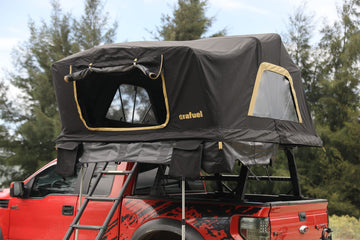
Outdoor camping has become increasingly popular with outdoor activity enthusiasts. More and more rooftop tent (RTT) brands are appearing in the market today. Each brand has its own characteristics for different types of customers.
How to choose a suitable and durable RTT?
Many new campers have questions about several aspects when choosing an RTT: size and capacity, ease of setup, weather resistance, durability, price, ventilation, weight, etc. One of the most important elements is the durability of the RTT. A good RTT will last you more than 5 years.
What type of material is durable?
There are two types of tents on the market, made from different materials: soft shell tents and hard shell tents. Hard cases are further divided into two categories: ABS plastic and aluminum honeycomb panels.
Soft shell tents are less durable. ABS plastic hard cases are known for their durability, strength and impact resistance. However, in some special environments, they are still not as good as aluminum honeycomb panels. Major brands in the market, such as iKamper and FSR, use aluminum honeycomb panels for most of their tents, which can significantly extend the life of a tent.
However, some brands only use a single layer of aluminum honeycomb panels, which is much less durable than using double-layer aluminum honeycomb panels. All Crafuel brand tents use double-layered aluminum honeycomb panels, making them more durable and aesthetically comparable to other major brands.
What are Rigid Aluminum Honeycomb Panels?
Rigid aluminum honeycomb panels are structural materials made of aluminum sheets and a honeycomb structure. The honeycomb core is made up of hexagonal, beehive-like cells that are usually glued or encapsulated between two thin sheets of aluminum. This construction creates a lightweight yet rigid panel, offering an excellent strength-to-weight ratio.
Rigid aluminum honeycomb panels are widely used in various industries including aerospace, naval, automotive and construction. They provide high strength, durability and rigidity while maintaining low weight. These panels are often used in applications requiring lightweight but strong structural components, such as aircraft floors, interior panels, sandwich panels for building facades, and protective coatings for vehicles.
The rigid aluminum honeycomb panels on the tents.
Aluminum honeycomb panels can be used in the construction of certain types of tents, especially those designed for specific uses or demanding environments.
- Lightweight and Strong Structure: Aluminum honeycomb panels are renowned for their high strength-to-weight ratio. Their use in tent construction helps reduce overall weight while maintaining structural integrity. This is especially beneficial for backpacking tents or expedition tents where weight is a critical factor.
-
Impact Resistance: The panels' honeycomb structure provides excellent impact resistance, making them suitable for harsh outdoor environments. They can withstand external forces or accidental impacts better than conventional materials.
-
Thermal Insulation: Aluminum honeycomb panels can provide good thermal insulation properties. This can help regulate the temperature inside the tent, keeping it cooler in hot weather and warmer in cold weather.
-
Weather Resistance: Aluminum is naturally corrosion resistant, making honeycomb panels suitable for use in tents exposed to harsh weather conditions. They are less prone to rust and degradation, ensuring that the tent remains durable and long lasting.
-
Rigidity and stability: The structural rigidity of the aluminum honeycomb panels reinforces the stability of the tent. It helps maintain its shape even in windy weather, reducing the risk of it collapsing or warping.
In conclusion, tents using aluminum honeycomb panels can be more specialized or high-end products, usually designed for specific uses such as mountaineering, expeditions or camping by extreme weather conditions. They may also have a higher price tag compared to traditional tent materials, but at the same time they offer better value for money.




